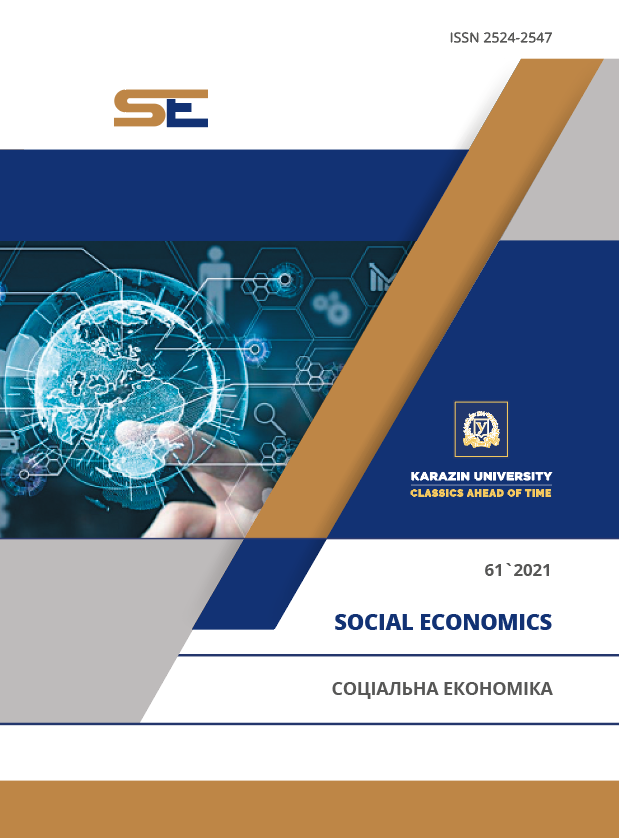LEARNING ORGANIZATION: A NEW MANAGEMENT PARADIGM
Abstract
The article substantiates the need and forms an actual conceptual foundations vision of a learning organization development, which has a number of unique competitive advantages due to the effective intellectual potential use. A number of differences in understanding the essential learning organization characteristics, as well as its fundamental differences with a traditional organization, are distinguished. The key concepts of the formation of a learning organization, as a fundamental component of the intellectual potential management system are specifying. Implementation of the formulated concepts will create a basis for building a learning organization to accelerate the transition to an innovative development model. The problems of individual and organizational training as the necessary condition for the development and effective use of the organizations intellectual potential are analyzed. The fundamental principles of learning organization constructing, which are based on a new management paradigm are highlighted. The author's definition of the "learning organization" and "corporate culture" categories essence is given. The theoretical model of the learning organization, which contains a description of such an organization and interconnection between its basic elements, is developed. For these organization elements, the requirements of which contributes to the development and implementation of the over pointed self-learning organization abilities at the highest possible level consideration and systematized. The main norms and values representing the corporate culture of the learning organization are given. Motivators and tools that make it possible to create an effective system of employees’ motivation to increase the level of labor intellectualization in the organization are revealed. The personnel professional development motivation methods are analyzed. The pyramid of managers’ professional competencies by organizational and serving levels and is accentuated at leadership phenomenon. The strategic vision of the learning organization development is formed. The actual directions of a defined problem further development is the search for ways to effectively use intellectual potential in the learning organizations conditions based on the use of a systematic approach.
Downloads
References
Global Human Capital Trends. (2016). The new organization: Different by design. Deloitte University Press. Retrieved from https://www2.deloitte.com/ua/uk/pages/human-capital/articles/introduction-human-capital-trends-2016.html.
Drucker, P. (2020). Management Challenges for the 21st Century. KM-BOOKS. (in Ukrainian)
Edvinsson, L. (2002). Corporate Longitude: navigating the knowledge economy. Book house.
Armstrong, L. (2007). Competing in the Global Higher Education Marketplace: Outsourcing, Twinning, and Franchising. New Directions for Higher Education, 140, 131-138. doi: https://doi.org/10.1002/he.287.
Senge, P. (2018). The Fifth Discipline: The Art & Practice of The Learning Organization. Moscow: Mann, Ivanov and Ferber. (in Russian)
Wiig, K. (1993). Knowledge Management Foundations: Thinking About Thinking: How People and Organizations Create, Represent and Use Knowledge. Retrieved from https://www.academia.edu/19382981/.
Earl, M. (2001). Knowledge management strategies: toward taxonomy. Journal management information systems, 18(1), 23-43.
Nonaka, І., & Takeuchi, H. (2011). The Knowledge-Creating Company: How Japanese Companies Create the Dynamics of Innovation Illustrated Edition. Moscow: Olymp-Business. (in Russian)
Hausmann, R., Hidalgo, C. A., Bustos, S., Coscia, M., Simoes, A., & Yildirim, M. A. (2014). The Atlas of Economic complexity: Mapping Paths to Prosperity. MIT Press, Cambridge, MA.
Cherwitz, A. R., & Sullivan, Ch. A. (n.d.). Intellectual Entrepreneurship. A vision for graduate education. Change. Retrieved from https://webspace.utexas.edu/cherwitz/www/ie/articles.html.
Gallagher, S., & Hazlett, S. (2004). Using the Knowledge Management Maturity Model (KMM). As An Evaluation Tool. Retrieved from http://bprc.warwick.ac.uk/km028.pdf.
Romanovskyi, O. O. (2015). Development of academic entrepreneurship and entrepreneurial higher educational institutions in conditions of globalization. Efficient economy, 11. Retrieved from http://nbuv.gov.ua/UJRN/efek_2015_11_17. (in Ukrainian)
Shevchenko, L. S. (2016). Mergers and Acquisitions in Higher Education. Actual Problems of Economics, 11, 160-167. URL: http://nbuv.gov.ua/UJRN/ape_2016_11_18.
Manzhura, O. V., Kraus, N. M., & Kraus, K. M. (2020). Ecosystem of Gig-economics and entrepreneurial university: evolutionary synergy of “virus innovation” and “digital jump”. Efectyvna ekonomika, 2. Retrieved from http://www.economy.nayka.com.ua/?op=1&z=7642. (in Ukrainian)
Pylypenko, H., Fedorova, N., Kuzenko, I., & Naumenko, N. (2020). Paradoxes of economic development: science and innovation in the modern world. Naukovyi Visnyk Natsionalnoho Hirnychoho Universytetu, 2, 153-159. doi: https://doi.org/10.33271/nvngu/2020-2/153.
Ostrovska, H. Y. Maliuta, L. Ya, Sherstiuk, R. Р, Lutsykiv, I. V., & Yasinetska, I. А. (2020). Development of intellectual potential at systematic paradigm of knowledge management. Naukovyi Visnyk Natsionalnoho Hirnychoho Universytetu, 4, 171-178. doi: https://doi.org/10.33271/nvngu/2020-4/171.
Ostrovska, H., Demianyshyn, V., Maliuta, L., Sherstiuk, R., Kuz, T., & Reznik, N. (2020). Intellectual Potential of Ukraine: Realies and Prospects of Efficient Use in the Knowledge-Based Economy Conditions. International Journal of Advanced Science and Technology, 29(9s), 4622-4634.
Kinash, I. P. (2015). Current State of Infrastructure Provision of Education in Ukraine. Actual Problems of Economics,7(169), 259-262.
Sytnyk, Y. S. (2017). Intellectualization of enterprise management systems: concept, system monitoring and modeling. Lviv: Lviv Polytechnic Publishing House. (in Ukrainian)
Ostrovska, H. (2021). Conceptual principles of industrial enterprise intellectual potential management use. Galician economic journal, 68, 1, 128-137. doi: https://doi.org/10.33108/galicianvisnyk_tntu2021.01.128. (in Ukrainian)
Senge, P. (2018). The Fifth Discipline: The Art & Practice of The Learning Organization. Moscow: Mann, Ivanov and Ferber.
Sipa, М. (2019). Diversification of Capabilities of Economies in the Field of Talent Management. Poland Against the Background of the European Union. European Journal of Sustainable Development, 8(2), 268-278. doi: https://doi.org/10.14207/ejsd.2019.v8n2p268.




